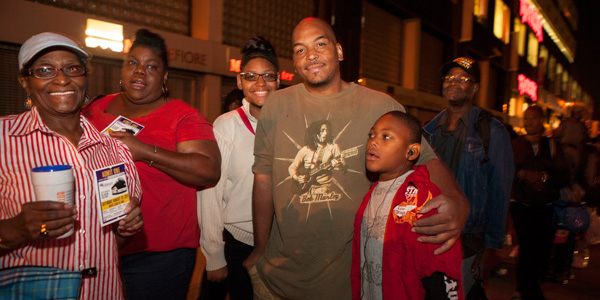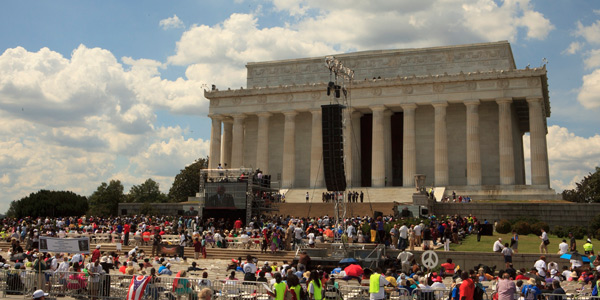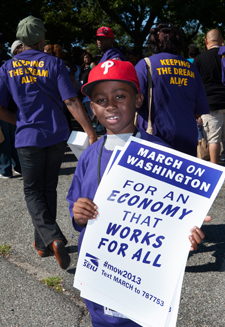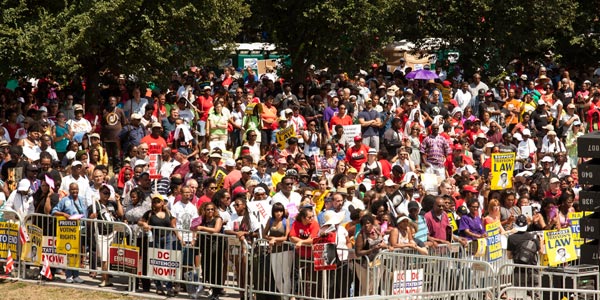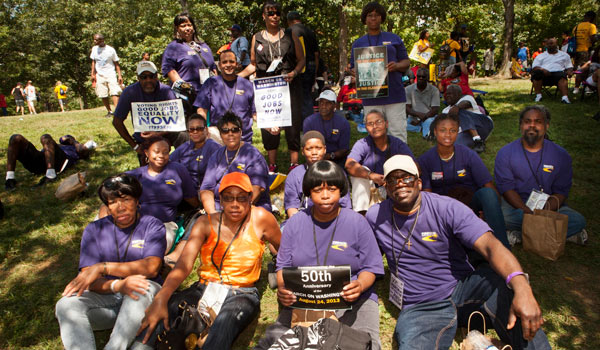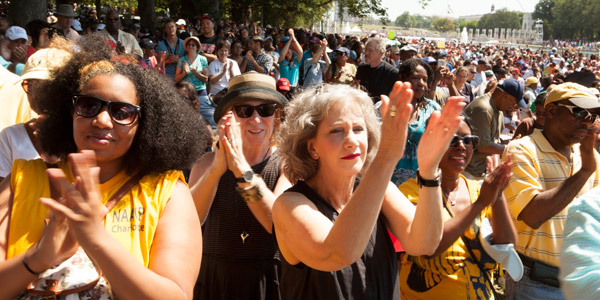Thousands of 1199ers Go to DC to Mark 50th Anniversary of March on Washington
August 27, 2013
The National Mall in Washington, DC was alive on August 24 with reverence, remembrance, longing, and frustration as an estimated 100,000 people gathered there from around the nation to mark the 50th anniversary 1963’s historic March on Washington where Dr. Martin Luther King, Jr. delivered of his iconic “I Have a Dream” speech.
Among them were 3,000 active and retired members of 1199SEIU and their families who traveled by bus from the Union’s New York, New Jersey and Maryland/DC regions, as well as the Union’s Retiree Divisions in North and South Carolina.
Era Joseph, a retiree from St. Luke’s Hospital in New York City, brought her son Joseph, her daughter-in-law Alexandra, her granddaughter Taylor, 16, and her grandson, Joseph, 11.
“1199 is the Martin Luther King, Jr. Union and they didn’t get to experience the first speech so this is history for them,” said Joseph. motioning to her family, as she stood with them at Fordham Plaza in the Bronx, waiting to board a bus for Washington. “We need to remember also that we are still struggling. It’s a beautiful thing to me when the younger generation takes part and to see them here. Our voting and civil rights are still under attack. We saw that with the Supreme Court decision. Everyone still has to be involved and that’s why we’re here.” Groups representing the nation’s breadth and diversity began arriving on the Mall before sunrise and poured in throughout the day. People carried banners and signs and wore every hue of message-emblazoned t-shirt. Represented in some way was the full spectrum of grinding problems that continue to plague the nation and comprise the gulf of racial and economic disparity that Dr. King had hoped to see bridged by now: Justice for Trayvon Martin, the restoration of Voting Rights Act, fair education policies, an end to the prison-industrial complex, labor organizing rights and women’s rights. “I feel it’s a privilege for me to be here,” said Shalonda Maples, a CNA at Burnt Tavern Nursing and Rehabilitation in Brick, NJ, who came with husband Justin and six-year-old daughter, Constance. “I wanted to come and show our family’s support. I’m hoping this march can lead to a change in the stand your ground laws. And when it does I want my daughter to know that she was a part of this.”
“It’s a very emotional day for me,” says Bill Pigford, a clinical specialist at Prince Georges Hospital Center in Cheverly, MD. Pigford was a member of CORE (the Congress of Racial Equality), one of the nation’s seminal Civil Rights groups which helped organize the first March on Washington.
“My life at that time was sit-ins and marches and we were registering people to vote,” he says. “My mother was afraid. She thought I was going to get killed. I told her that I was already dead. Our life in Mississippi under those conditions was no life. It was very hard. White people could tell you to get off the sidewalk and use the N word. I saw Black men beat down. They’d drive through our neighborhood yelling obscenities. Schwerner, Cheyney and Goodman were killed right up the road from where I’m from. We had lynchings. I worked at the charity hospital in my town and we couldn’t even sit down to eat. We had to go out in the back.”
Pigford, now 71, recalled traveling to Washington, DC during that blistering 1963 August. “We had a police escort and we didn’t stop anywhere,” he says. “That rally was very inspirational. It gave us the inspiration to turn up the heat in our work - which we did.”
“Today I’m worried that a lot of people think it will all just work out fine. It’s not fine,” he continues. “We need to stand up now and we’ll need to stand up in the future. The same problems that existed 50 years ago exist today.”
Pigford is pained, but not defeated, by the impediment and slow arrival of justice and equality. “Look how they changed our voting rights with the stroke of a pen,” he says, referring to the recent U.S. Supreme Court decision. “It hurts me.
“In Mississippi we were denied our vote and subjected to poll taxes and forced to recite part of the Constitution in order to vote. I feel cheated by what’s going on. All of the people who died and who had their homes and cars burned and fire bombed - all of that was wasted with the stroke of a pen and we need to remember that.”Yet Pigford cautions against malice, lest we poison our future. “In spite of everything that has happened, I have refused to let them turn me into what they would have me be,” he says. “I choose not to hate because I know that somebody’s coming up the other side of the mountain to right what has been done wrong.”
Speakers at the August 24 rally - which was followed by a march past Dr. King’s Memorial to the Washington Monument - included Attorney General Eric Holder; Rep. John L. Lewis of Georgia, an organizer of the 1963 March; Myrlie Evers-Williams, activist, author and widow of slain leader Medgar Evers; Rev. Al Sharpton; 1199SEIU President George Gresham; and Sybrina Fulton, Trayvon Martin’s mother.
“Trayvon Martin was my son, but he’s not just my son, he’s all of our son and we have to fight for our children,” said Fulton, who was greeted by roars of cheers and applause. Many held high posters of Trayvon’s image and listened reverently his mother made her brief remarks.
While 1199ers from the Union’s Florida region didn’t travel in a group to Washington, DC for the March anniversary, several helped plan and participated in a Youth Empowerment Summit that was held in Sanford, the city where Trayvon Martin was killed. The Summit included age-specific workshops for kids to discuss their feelings about Martin’s murder; conversations with parents, a conversation with a retired City of Miami police officer about responding to police stops, and organizing for the repeal of stand your ground laws.Monique Walker, an 1199er who helped organize the summit, would have liked to have been in Washington but felt it was vital to be in Florida during the weekend. “I believe that we are the dream that Dr. King was talking about. We are the manifestation of his dream,” she says. “This wasn’t the time for me to be getting on the bus or to celebrate. I needed to be here and to step up here like never before.”
Immediately after Trayvon Martin’s murder, Florida region1199ers formed a Social Justice Committee and were among the leaders in organizing demonstrations, marches and promoting ongoing community dialogue.
“After the verdict, some of my co-workers said they didn’t want to talk about it, but I said ‘No, we have to talk about this’,” says Pat Diaz, an RN at University Hospital in Tamarac, FL. “This has been our experience for so long. And now that this anniversary is here, it means so much because of all we have gone through with Trayvon. It just shows us how much work we have to do to continue our movement.”
Radcliffe McPherson, a cook at Hudson Park Nursing and Rehabilitation Center in Albany, NY was watching his eight-year-old son Kenyon’s blithe enjoyment of a Popsicle on a hot summer day. Over the loudspeaker Martin Luther King lll passionately extolled the audience that “we can and must do more.”
As the day wound down McPherson thought for a moment about entreaties for vigilance and remembrance and glanced down and the little boy standing beside him. “This very important anniversary is more for my son than for me. It gives him insight into how Black people have to struggle to be equal and respected,” said McPherson. “Maybe being here will help him growing up to succeed in today’s world as a Black man. One day when I’m not around he can say he experienced this with his dad.”


